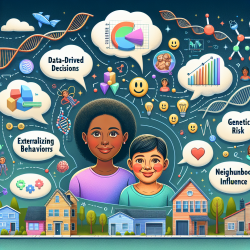Understanding the Intersection of Neighborhood, Social, and Genetic Influences
The study titled Evaluating Neighborhood, Social, and Genetic Influences on Precursors of Alcohol Use Risk Behavior in African American Adolescents offers a comprehensive look at the factors influencing externalizing behaviors, which are precursors to alcohol-related issues. This research is crucial for practitioners aiming to improve outcomes for children, particularly in economically disadvantaged areas.
Key Findings and Implications for Practitioners
The research highlights several critical points:
- Externalizing behaviors are positively associated with family stressors, racial discrimination, and genetic liability, while neighborhood variables alone were not significant predictors.
- Interactions between neighborhood violence, transitions, and family stressors significantly impact externalizing behaviors.
- Genetic factors interact with environmental stressors, influencing the risk of developing externalizing behaviors.
For speech-language pathologists and other practitioners, these findings underscore the importance of considering multiple ecological levels when developing intervention strategies. By understanding the complex interplay of genetic, social, and neighborhood factors, practitioners can tailor interventions that address the unique needs of each child.
Data-Driven Interventions: A Path Forward
Practitioners can leverage these insights to enhance their practice in several ways:
- Holistic Assessment: Incorporate assessments that evaluate family stressors, experiences of discrimination, and neighborhood conditions alongside genetic predispositions.
- Targeted Interventions: Develop interventions that address specific stressors at different ecological levels, such as family counseling, community engagement, and individual therapy.
- Collaborative Approaches: Work with community organizations and schools to create supportive environments that mitigate the impact of neighborhood violence and transitions.
Encouraging Further Research
This study opens the door for further research into how speech-language pathology can integrate these findings into practice. Future studies could explore the effectiveness of interventions that specifically target the identified risk factors and their interactions.
To read the original research paper, please follow this link: Evaluating Neighborhood, Social, and Genetic Influences on Precursors of Alcohol Use Risk Behavior in African American Adolescents.










